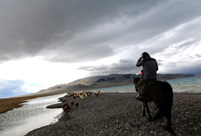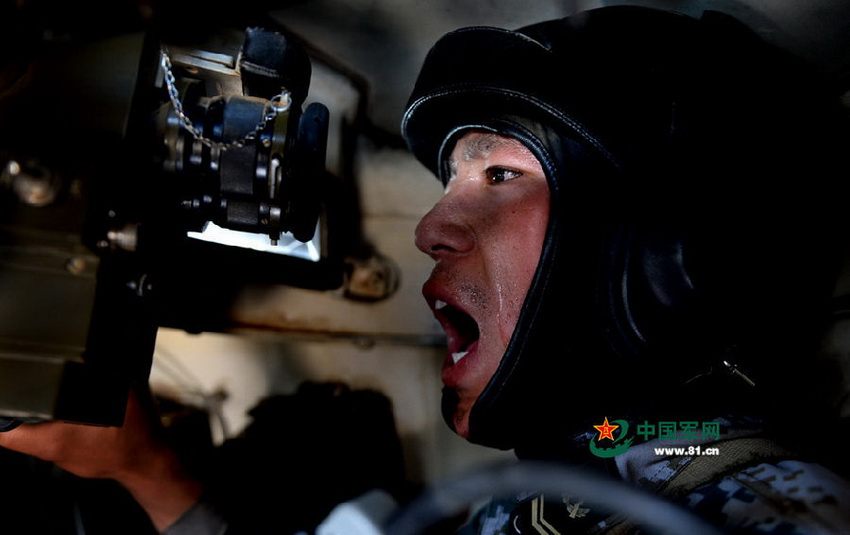 College-student-turned nun becomes famous on Internet
College-student-turned nun becomes famous on Internet
 Japanese airplanes tail Chinese warplane in China's ADIZ
Japanese airplanes tail Chinese warplane in China's ADIZ
 China applies for UNESCO listing of Nanjing documents
China applies for UNESCO listing of Nanjing documents
 Picturesque scenery in Hongcun Village
Picturesque scenery in Hongcun Village
 Japan's PM vows to resume commercial whale hunt
Japan's PM vows to resume commercial whale hunt
 Luoyang aims to become 'Chinese Culture City'
Luoyang aims to become 'Chinese Culture City'
 Century-old jade disc found confirms ancient legend
Century-old jade disc found confirms ancient legend
 A serious mind behind Chinese leader
A serious mind behind Chinese leader
 Panda Cubs to Predict 2014 World Cup Winners
Panda Cubs to Predict 2014 World Cup Winners
 China Southern Airlines flight attendants win titles in service contest
China Southern Airlines flight attendants win titles in service contest
Highlights
• The situation in Iraq continues to deteriorate since bloody clashes broke out earlier this month.
• The insurgent groups, spearheaded by militants from the ISIL, come from the country's Sunni Arab minority.
• The crisis in Iraq has raised alarm in the U.S. and Iran, both of whom support the al-Maliki government.
BAGHDAD/WASHINGTON, June 17 -- The situation in Iraq continues to deteriorate since bloody clashes between insurgent groups and government forces broke out earlier this month.
Large swathes of Iraq's northern territories are now in the hands of militant groups, fuelling fears the country may split and a full-blown sectarian war erupt in the Middle East.
SECTARIAN RIFT
The insurgent groups, spearheaded by militants from the Islamic State of Iraq and the Levant (ISIL), come from the country's Sunni Arab minority. They believe the current Shiite-dominated government has treated Sunnis unfairly.
Shiite Prime Minister Nouri al-Maliki, meanwhile, denounced the insurgents as "terrorists" and has vowed to overcome them.
However, the government's troops have been dramatically defeated during the past week, with large parts of the country's north falling into the hands of the rebels.
On Monday, the insurgents seized the strategic city of Tal Afar near the Syrian border, and an Iraqi army helicopter was shot down during clashes.
The militants had previously seized Mosul, the second largest city in Iraq.
"Tal Afar has fallen into the hands of the militants of the ISIL, after they heavily pounded the city with mortar rounds and rockets since last night," said Mohammed Abdul Qader, head of the city council.
"The defenders of the city have withdrawn after running out of ammunition," he said, adding many of the officers disappeared after the battle.
Qader told Xinhua dozens of families had left their homes as a result of the street battles and mortar shelling. Most of the displaced families have fled to the city of Sinjar, some 60 km west of Tal Afar.
U.S, IRAN STEP IN
The crisis in Iraq has raised alarm in the United States and Iran, both of whom support the al-Maliki government.
The two long-time foes even discussed ways to stop the violence Monday on the sidelines of separate nuclear negotiations in Vienna, Austria.
Although the United States dismissed speculation of U.S.-Iranian military cooperation, Secretary of State John Kerry said the U.S. was "open to any constructive process."
State Department spokeswoman Jen Psaki said any discussion with Iran would concern ways Iran could help press al-Maliki's government to be more inclusive and treat all of Iraq's religious and ethnic groups equally.
Any talks with Iran "would be to discuss the political component here and our interest in encouraging Iraqi leaders to act in a responsible, nonsectarian way," she told reporters. "Certainly a discussion of that is something that we would be open to."
Meanwhile, the White House on Sunday began its deployment of up to 275 U.S. soldiers in Baghdad "to provide support and security for U.S. personnel and the U.S. Embassy in Baghdad," according to U.S. President Barack Obama.
While the force was being deployed for the purpose of protecting U.S. citizens and property, the personnel were still equipped for combat, Obama said in a report to Congress.
"This force will remain in Iraq until the security situation becomes such that it is no longer needed," he said
The Obama administration said it was mulling a range of options in support of Baghdad, including air strikes as requested by the Iraqi government, but would not send in U.S. ground troops.
While the White House continues to review its options, Iran's military leaders are already taking action.
The commander of Iran's elite Quds Force, Gen. Ghasem Soleimani, consulted with the Iraqi government Monday on how to halt the insurgents' advance.
According to media reports, Soleimani has been inspecting Iraqi defenses and reviewing plans with top commanders and Iranian-backed Iraqi Shiite militia.
INTERNATIONAL RESPONSE
UN Secretary-General Ban Ki-moon has condemned the recent upsurge of violence in Iraq.
A statement issued by Ban's spokesperson Sunday night said reports of mass summary executions by ISIL were deeply disturbing and underscored the urgency of bringing the perpetrators of such crimes to justice.
Saudi Arabia said Monday it rejected any foreign intervention in Iraq's domestic affairs as the country was trying to turn around a worsening security situation.
The Sunni-dominated country blamed Baghdad's "sectarian and exclusionary policies" for fuelling the insurgency.
Neighboring Turkey is sending humanitarian aid to the violence-hit cities of Iraq, particularly to the Turkmen-populated areas, while Jordan is closely following the situation and its army is on alert to protect the country from any spillover effects.
Related:
 Super daddies in 2014 World Cup
Super daddies in 2014 World Cup Rebuilding the silk road
Rebuilding the silk road College girls take stylish photos to help enrollment
College girls take stylish photos to help enrollment Top 10 Chinese products scoring World Cup goal
Top 10 Chinese products scoring World Cup goal PLA units hone their tank combat skills
PLA units hone their tank combat skills Attendants shine at Xinjiang-Lanzhou high-speed rail
Attendants shine at Xinjiang-Lanzhou high-speed rail Jiuzhai Valley - fairyland of the world
Jiuzhai Valley - fairyland of the world Can't take eyes off national teams in World Cup
Can't take eyes off national teams in World Cup Beijing strips off to celebrate summer
Beijing strips off to celebrate summer
 Top 20 hottest women in the world in 2014
Top 20 hottest women in the world in 2014  China's top 10 representative architectures
China's top 10 representative architectures Cute animals' leisure summer in zoo
Cute animals' leisure summer in zoo Exhibition of the Buddha held in Tibet
Exhibition of the Buddha held in Tibet Grandpa Kang takes Gaokao for 14th time
Grandpa Kang takes Gaokao for 14th time Incredible animal migration in Xinjiang
Incredible animal migration in Xinjiang Day|Week|Month